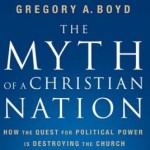We run our website the way we wished the whole internet worked: we provide high quality original content with no ads. We are funded solely by your direct support. Please consider supporting this project.

The Kingdom of God ≠ Political Activism
Given the centrality of following Jesus’ example, it is vitally important we not only notice that Jesus was a revolutionary (see post) along with some ways that we can join his revolution (see that post here), but how he was a revolutionary. Many Christians today assume that in order to revolt against ungodly aspects of the culture one must become a political activist. In their sincere passion, they try to get people to vote a certain way, carry picket signs or involve themselves in the political process in some other way.
As people who live in a democracy, Christians are certainly free to express their opinions however they see fit. But if one chooses to participate in the political process, it’s vitally important they understand that there is nothing distinctly Christian about this participation. Their opinions may be completely correct and noble, but they are not for this reason “Christian.” Being “Christian” means Christ-like, and the fact of the matter is that, though he was a social revolutionary, Jesus never showed the slightest interest politics. Nor did any of his earliest disciples. The only instructions Christians are given vis-à-vis government in the New Testament is to respect and submit to authorities as much as possible, to pay our taxes and to pray for leaders so there will be peace (Mk 12:13-17; Rom 13:1-7; I Pet 2:13-17). And even these instructions are not given out of any concern for how government should run but to simply facilitate the spreading of the Gospel.
Jesus’ complete lack of interest becomes even more significant when we remember that he lived in politically volatile times. Not surprisingly, as people began to suspect that Jesus might be the Messiah, they constantly tried to get his opinions on political matters. But Jesus consistently refused. The reason is that the kingdom of God that Jesus came to establish has nothing to do with having the “right” opinions about how the kingdoms of the world should run. It’s rather a kingdom that “is not of this world” (Jn. 18:36).
Jesus didn’t remain silent, however, when asked questions about the kingdom of the world. He rather turned the question around on the questioner and transformed it into a kingdom of God question.
For example, at one point in his ministry some opponents tried to get Jesus to weigh in on the divisive topic of whether or not Jews should obey the law of the land and support the oppressive Roman government by paying taxes. Jesus neither ignored nor obliged the question. Instead, he simply held up a coin and asked, “Whose head is this, and whose title?” It was, of course, the emperor’s. So, Jesus concluded, “Give … to the emperor the things that are the emperor’s and [give] to God the things that are God’s” (Mt 22:20-22).
Many Christians have mistakenly thought that when Jesus said these words he was claiming his followers have a duty to their government—to be good citizens, to vote, to serve in office or even to fight for their nation. If we understand Jesus’ clever response in its original context, however, it clearly means nothing of the sort.
To understand what Jesus truly meant, you need to know that most Jews of this time were deeply offended by currency that bore the image of the emperor. They saw it as a direct violation of the commandment against making images (Ex. 20:4; Lev. 26:1). They understood that only God can make an image of himself, and he did so when he made humans (Gen. 1:26-27).
In responding the way he did to his Jewish audience, therefore, Jesus was brilliantly linking the issue of pagan idolatry with the issue of paying taxes. He was in essence saying, “Since we all agree that this piece of metal is idolatrous because it bears the image of Caesar, should we Jews really fight among ourselves over how much of it we should keep? Our only concern should be with making sure we are giving to God that which bears his image—namely, our whole being.” In this way Jesus wisely transformed a question pertaining to the reign of Caesar into a question that pertained to the reign of God.
This and other episodes make it clear that Jesus did not come to answer our political questions or give us a “new and improved” version of the kingdoms of the world. He rather came to raise a radically different set of questions and establish a radically different kind of Kingdom. He came to plant the mustard seed of a new, alternative world order under the reign of God that would eventually render all the political kingdoms of the world obsolete.
This is not to say that a kingdom person can’t have political opinions and vote, if they feel so led, or involve themselves in social justice movements. But kingdom people must remember our unique call has nothing to do with government, and everything do to with a unique way of living. The hope of the world resides not in achieving any particular form of government. It rather resides in the willingness of Jesus followers to simply be the kingdom God called us to be.
Most importantly, we must always follow Jesus’ example of keeping the kingdom holy—set apart, unique—by not letting it get looped up into the innumerable, ambiguous political issues that plague the kingdom of the world. For the kingdom is not the best and wisest version of the kingdom of the world. It’s rather a kingdom that is “not of this world.” It never resembles Caesar, using power over others. It rather resembles Jesus, sacrificially serving others.
Photo credit: desertdutchman via Visualhunt.com / CC BY
Category: General
Tags: Kingdom Living, Kingdom Revolution, Politics
Topics: Ethical, Cultural and Political Issues
Related Reading

Don’t Be a Functional Atheist at Christmas
All of us raised in Western culture have been strongly conditioned by what is called a secular worldview. The word secular comes from the Latin saeculum, meaning “the present world.” A secular worldview, therefore, is one that focuses on the present physical world and ignores or rejects the spiritual realm. To the extent that one…

Podcast: Should Christians Seek Political Office?
Can a politician even be effective at politics if they are faithful disciples of Jesus? Links: Greg’s book: “The Myth of a Christian Nation“ http://traffic.libsyn.com/askgregboyd/Episode_0024.mp3

Does Nonviolence Work?
The teaching of Jesus on nonviolence strikes many as ludicrous, impractical, unpatriotic, irresponsible, and possibly even immoral. “Surely Jesus expects us to take up arms against Muslim extremists to protect our country and families!” If I had a dollar for every time I’ve heard something like that response, I’d be a fairly wealthy man. The…

Help Us Name Our Connecting Site!
As most of you know, there is a fledgling kingdom movement that is rising up around the globe today. It is a post-Christendom, neo-Anabaptist movement that I’ve sometimes described as “a Jesus-looking God raising up a Jesus-looking people to transform the world in a Jesus-kind-of-way” – though the description would be more accurate (but also more…

“For many…the American flag has smothered the glory of the cross, and the ugliness of our American version of Caesar has squelched the radiant love of Christ.” [Quotes]
“This myth harms the church’s primary mission. For many in America and around the world, the American flag has smothered the glory of the cross, and the ugliness of our American version of Caesar has squelched the radiant love of Christ. Because the myth that America is a Christian nation has led many to associate America…

Praying for Peace During Political Hostility
Jesus calls his disciples to be “peacemakers” (Mt 5:9). During this season of political animosity, we have a great opportunity to practice being disciples by offering an alternative way of interacting with each other. One primary way we do this is by using the unique authority we have to affect the world through prayer to…
